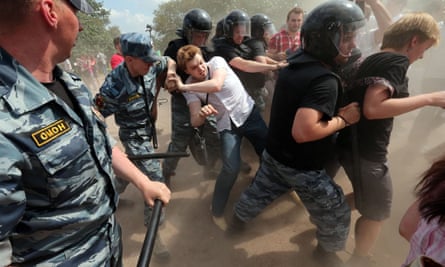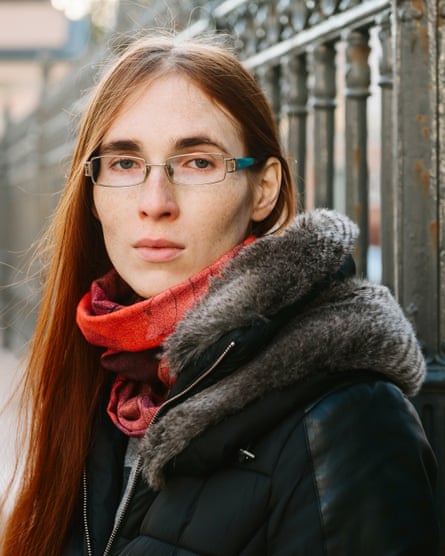‘Condoms can’t protect you from HIV,” says Vladislav Ivanov, a 34-year-old hotel worker from Rostov-on-Don. He is one of an estimated 1.5 million people in Russia living with HIV. And because he is not receiving treatment, he is at a high risk of passing on the virus.
Does this worry him? “Yes, but I still don’t wear condoms because I don’t like them. Most people in Russia think condoms can’t protect you from HIV. People think of them only in terms of contraception.”
Ivanov’s story is chilling. Diagnosed HIV positive in March, he says he was calm when he heard the news as he was not convinced HIV existed. Because of this, he had had unprotected sex with a man who had told him he was HIV positive. “I didn’t worry about it because I’d seen a TV programme that denied the existence of HIV.”
Ivanov says that since his diagnosis he has spent his time researching the virus and now feels “in a state of confusion”. One thing he is sure of is the need to hide his HIV status from society; when his last employer found out, he lost his job.
According to figures just released by the World Health Organisation and UNAids, more than 103,000 new cases of HIV were reported in Russia in 2016, an increase of 5% over the previous year, and it is estimated that there are another 500,000 undiagnosed cases. Eastern Europe and Central Asia is the only region in the world where HIV infections are rising, with Russia accounting for eight out of every 10 new infections.
I want to find out why. But as a gay man, I have heard terrible stories about the persecution gay people endure in Russia. As my plane lands, I feel a rumble of fear. I am later joined in my hotel by a group of LGBT activists. Evgeny Pisemskiy is director of Phoenix Plus, an HIV charity that is the only Russian organisation to focus on the needs of men who have sex with men. Maya Demidova is a transgender woman who works for the organisation as a coordinator for the Moscow region. And Yury Maximov is our interpreter.

We set off for the Moscow LGBT centre but on the Metro I notice that we stand out from everyone and attract stares. Sometimes these are looks of disapproval, sometimes even disgust. A sense of threat hangs in the air. Demidova tells me that once she was beaten up on a rush-hour train by a man who had spotted that she was trans. I try not to worry but cannot help feeling afraid when we leave the Metro and pass a bakery that has a sign saying “No Faggots Allowed” in the window. Pisemskiy tells me there are several of these around the city.
We arrive at the centre, which is in effect one room in an unmarked residential block in an inconspicuous suburb. I am told its existence is a secret known only by those who need it.
One of these is Alexander Zhelezkin, a 30-year-old social worker from a small village in the Urals. He has been openly gay since the age of 25. I ask what reactions he had when he came out. “Some people disowned me, some said they hated me but mostly they said, ‘You’ve chosen a hard life.’ My mum says she hopes I’ll change and become normal.”
Although Zhelezkin says he is often verbally insulted because of his sexuality, he has not encountered any violence but this might be because he does not use hook-up apps such as Grindr. Several of his friends who do have not been so lucky. “A lot of my friends go to meet someone and walk into a trap. I know one rich guy who went to a hook-up in an apartment and there was a mob of 10 people with dogs who started being violent with him. He had to give them 50,000 roubles to get out.”
I remark on how calm he is as he recounts such horrors. “It’s because it’s every day,” he explains. “It’s usual for me.” Zhelezkin is HIV negative but is taking PEP, a course of HIV prevention drugs that is taken for 30 days after exposure to risk. He explains that there is very little information about PEP in Russia and limited access.
PEP is only one of the several tools being used to combat HIV around the world. Perhaps the most effective weapon is the anti-retroviral treatment given to those diagnosed as positive; in most cases, this diminishes their viral load to undetectable levels, which means it is impossible for them to pass on the virus. But for this to happen, first they have to get tested.
I meet Alexander Shumilov, from an HIV support group, La Sky. He tells me that gay men in Russia are reluctant to be tested, not only because of the ignorance about HIV but also because of the huge stigma around the virus. Coupled with the culture of homophobia, this acts as a powerful deterrent.
“When a man goes to a clinic to get tested and is diagnosed HIV positive, the first person he sees is an epidemiologist who asks him how he contracted the virus,” says Alexander. If he admits to having contracted it through sex with a man, his case is registered under what is known as a Code 103 – information that is accessible by the police and the ministry of internal affairs.
According to official statistics, only 2% of people with HIV in Russia register as Code 103. If we compare these figures with others recorded around the world, the suggestion is that gay men are not being honest about their sexuality. Alexander explains that this only helps perpetuate the problem; if the government can say so few people with HIV are men who have sex with men, they can get away with doing nothing to help them.
In the meantime, gay men with HIV continue to go undiagnosed and untreated. I am told stories of people falling ill in a way that no longer happens in the west. According to the latest figures from WHO and UNAids, between January and June this year, 14,631 Aids deaths were recorded in Russia, a 13.5% increase over the previous six months.
That evening, the activists take me out on to the gay scene. I am nervous as everyone has told me there is no such thing as a safe space for gay people in Russia. I have heard stories about people being attacked or robbed as they leave gay venues, and have even heard about grenades being thrown through the window of a club in St Petersburg. But as so few of those affected are willing to go to the police there are no official statistics to reflect the problem.
Demidova tells me that she was raped by a stranger she met in a club, who she believes spiked her drink. I ask if she reported the incident to the police and she scoffs: “Are you kidding? If I went to the police station they’d laugh in my face and they wouldn’t do anything. Once I was arrested and spent a few hours in a police station and I heard so many insulting things about transgender people. The police hate people like me.”

Her story preys on my mind as I visit the stylish Mono Bar and the busy Central Station club. Inside they look like any other European gay venues, but the difference is they are hidden away like a dirty secret. Their exteriors are not draped with rainbow flags and to enter you have to pass through heavy, unmarked doors and an airport-style security check. It is hard to relax. I have no idea how much danger I am in but I do not stay late.
The next day I interview Pisemskiy. He set up Phoenix Plus in 2006 to help men who have sex with men who are HIV positive by arranging peer-to-peer support, distributing leaflets with information about anti-retroviral therapy and running the oldest website in Russia devoted to HIV. The organisation is supported by the Elton John Aids Foundation, which cannot have its own direct presence in Russia. “Any work the foundation did directly would be interpreted as trying to destroy our own institutions,” says Pisemskiy. “In Russia, HIV infection and HIV are seen as western imports and diseases.”
One of Phoenix Plus’s priorities is distributing self-testing kits to men who are too nervous to be tested for HIV in a clinic. I spend a day accompanying the group’s staff as they distribute the kits. I go with them to one of the few pharmacies willing to take part in the programme, where our interpreter shows me how simple it is to collect a pack. We move on to a cruising ground in Chinatown Park, where men sit on benches and pick up other men to take home for anonymous sex. It is cold and depressing and the men approached do not want to engage in conversation about testing for HIV. This is a place of deep shame.
Instead, we go to Voda, a gay sauna where men meet for casual sexual encounters. I discover Voda is like any western sauna, with a steam room, sauna and Jacuzzi as well as a labyrinth of private cubicles. But there is one major difference; unlike in most western saunas, condoms and lubricant are not handed out on entry. In fact, I cannot see them anywhere.
I accompany Ilya, a 21-year-old Phoenix Plus volunteer, as he circulates the bar area engaging men in conversation and offering them HIV self-testing kits. He is adept at breaking through their resistance but I am shocked at how many initially refuse to take a test as they believe HIV does not exist, with many of them calling it a conspiracy of western drug companies.
To find out why there is so much misunderstanding around HIV, I chat to Boris Konakov, 29, a former journalist who was born in western Siberia. He came out as gay and HIV positive on World Aids Day in 2016. Since then, he has not been able to secure work.
He tells me there is no gay press in Russia, very little representation of gay people in the mainstream media and President Vladimir Putin’s gay propaganda law of 2013 has forbidden journalists from doing anything to “promote” homosexuality.
“We need friendly journalists to get material out there,” he says, “but they’re afraid to write about gay issues. The problem is that the law is so vague that you could be accused of violating it just by giving information. It promotes complete silence on this issue.”
Because of this, Konakov believes the HIV epidemic among gay men remains invisible. His use of the word reminds me of something Pisemskiy said earlier that day: “To halt the epidemic in Russia, doctors say we need drugs, treatment and condoms, but I say these aren’t the main things. We can stop the epidemic only when we eradicate stigma around gay people.”
As I approach the end of my trip, it strikes me how simple it is; we already have the tools to eradicate HIV but they amount to nothing in the face of moral prejudice. If we can eradicate homophobia, we can eradicate HIV among gay men. If we can wipe out the stigma around HIV in general, we have the chance of wiping out the virus completely. I only hope that one day this message gets through in Russia.
Matt Cain is editor-in-chief of Attitude. This is an edited version of an article that will appear in the magazine on 7 December
